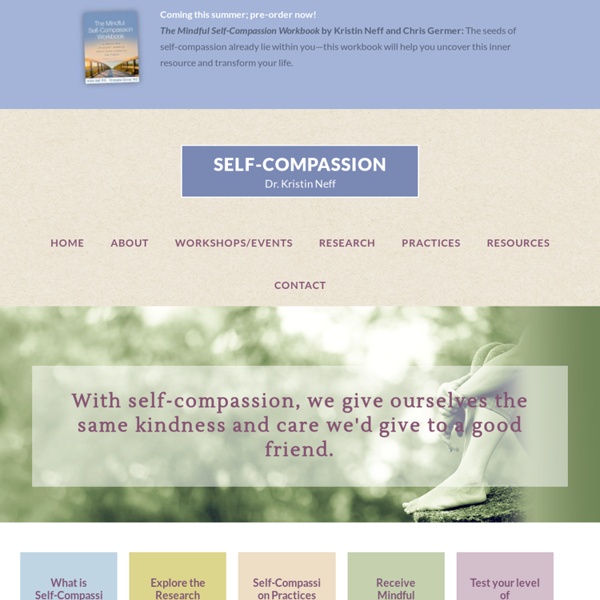



Room to Breathe Film - Mindful Schools Room to Breathe explores the personal transformations that happen for students, their families, and educators as mindfulness is introduced in a truly challenging public school environment. By providing a raw and realistic look at the experience, it shows how integrating mindfulness, along with patience, skill, collaboration and more, can transform even the most difficult classrooms. The trailer and the full-length film are available to watch, below. Watch the Trailer Watch the Film Continue the Conversation Share it with your principal and colleagues, and tell us what you think at community@mindfulschools.org.Inspired to learn more about integrating mindfulness in your work with youth?
fambly Self-compassion - A Healthier Way of Relating to Yourself Talks: Audio & Video archive Page 1 of 3712345 >Last » 2021/05/05 - Three Dimensions of Conscious Prayer Prayer can be a creative, vibrant and infinitely tender part of our spiritual awakening. 2021/04/30 - Namaste: Honoring the Light in All Beings The ritual of Namaste – bowing to the sacred in ourselves and others – helps us live from the... 2021/04/21 - Belonging to the Earth As a species, forgetting our belonging to our larger body of Earth is causing suffering for this entire living... 2021/04/14 - “Make Love of Your Self Perfect” Like a dense fog, chronic self-judgment blocks the light of our true nature. 2021/04/07 - Radical Self-Honesty: The Joy of Getting Real Our suffering arises from the unseen, unfelt, resisted parts of our psyche. 2021/03/31 - Fear of Aging: Finding Freedom in this Impermanent World – Part 2 While it’s natural to have fears of what’s ahead, when we learn to face the inevitability of change and... 2021/03/24 - Transforming Two Fears: FOF and FOMO 2021/01/27 - Spiritual Hope Sumo
creswell research David Creswell, assistant professor of psychology at Carnegie Mellon University in Pittsburgh, continues to do extensive research on how mindfulness can affect our health and our lives for the better. On anxiety: A 2013 study published in Social, Cognitive and Affective Neuroscience found that mindful attention reduces self-reported cravings in smokers, as well as reduced neural activity in the craving-related region of the brain. On smoking cessation: A study in NeuroImage in 2013 concluded that mindfulness-based cognitive therapy may be an effective treatment for reducing anxiety and mood symptoms in patients with generalized anxiety disorder. On loneliness: In 2012, a study published in Brain, Behavior and Immunity found that an eight-week Mindfulness-Based Stress Reduction (MBSR) program helps decrease loneliness in older adults. On behavior regulation: More mindfulness studies by David Creswell Creswell, J.D., Pacilio, L.E., Lindsay, E.K., & Brown, K.W.
CompassionateMind.net - Home The role of the adult, essentially, is to support and... Book Summary - How To Wake Up When we’re fully present for our life as it is, whether it’s pleasant or unpleasant at the moment, we have the potential to awaken to a peace and well-being that aren't dependent on whether a particular experience is joyful or sorrowful. Embracing our life in this way is the promise of peace left to us by the Buddha. Like How to Be Sick, How to Wake Up is a practical book—full of exercises and practices, all illustrated with easy-to-relate to personal stories from my experience as a Buddhist practitioner of over twenty years. Because the book focuses on integrating the Buddha’s teachings into everyday life, it is intended for both experienced practitioners and those with no background in Buddhism. The Buddha’s teachings are not passive.
Meditation Makes Us Act with Compassion You’re in a waiting room, seated next to two other people. There are only three chairs. A woman enters on crutches, a medical boot on one leg. Do you get up and offer her your seat? Pete Saloutos You’ll be much more likely to if you meditate, according to a new study published in Psychological Science. In the study, Paul Condon and Dave DeSteno of Northeastern University and Gaelle Desbordes of Massachusetts General Hospital assigned people with little or no meditation experience to one of two eight-week meditation classes, or put them on a wait list for a class. Both meditation classes were taught in a completely secular format. After eight weeks, the researchers observed how people responded to that waiting room situation. The researchers found that 50 percent of people from either of the meditation classes gave up their seat, whereas only 15 percent of the non-meditators did.